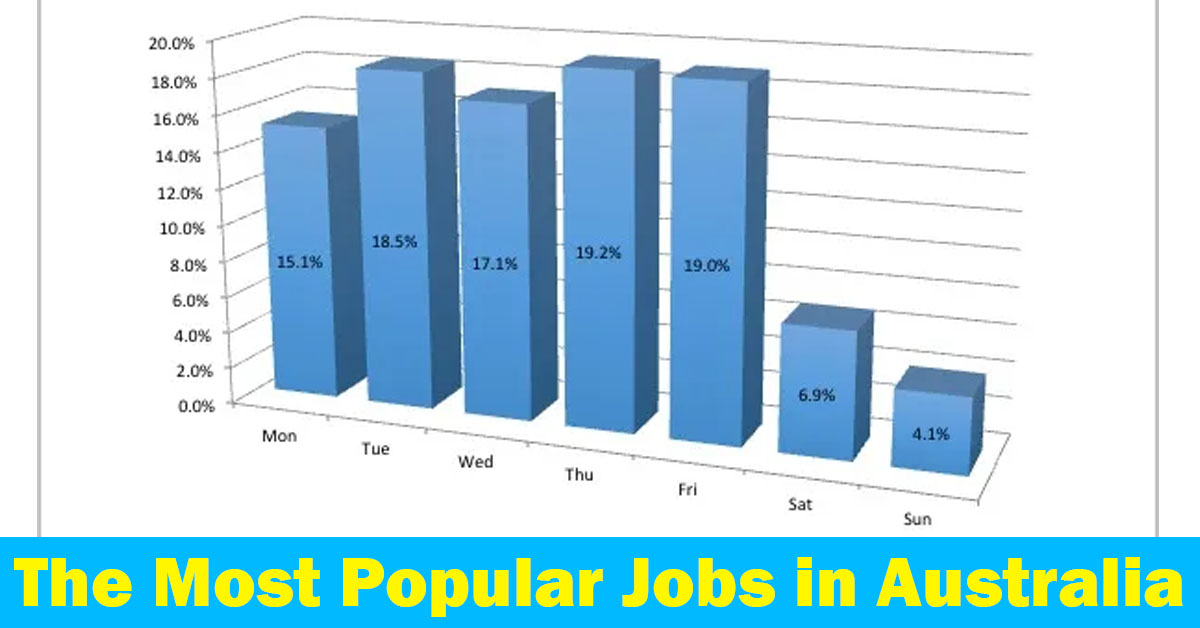The Most Popular Jobs in Australia
There are countless options available in Australia, including the most popular professions in health care, education, and social assistance. Here are a few of the top jobs for today. Health care workers and nannies are among the most promising. Other professions with high growth potential include civil engineers, cybersecurity specialists, and web application developers. Research and business development managers are also in demand. These are some of the fastest-growing jobs in Australia.
Health Care and Social Assistance
According to the 2016 Census, the health care and social assistance sector was the largest employer in Australia. Its number of workers increased by 16 percent, accounting for around 12 percent of the working population. The industry includes jobs in child care, aged care, and health services. Although many people in these fields are female, the majority of positions require some degree or VET training. Here are some of the top jobs in the industry.
The largest occupational group in Australia is healthcare, which directly employs over 1.2 million people. With an aging population and high population growth, the sector faces huge shortages. Many roles require extensive education and qualifications, and the consequences of this lack of supply can be life-threatening. As a result, the demand for healthcare workers in the country has grown, but it is difficult to find qualified candidates.
The NSC’s Internet Vacancy Index (IVI) data provides a proxy for labor demand. In September 2021, the eight largest employing occupations in the Health Care and Social Assistance sector placed 31,600 job advertisements, which represents 13.8% of the total recruitment activity across all occupations. The figures may be misleading, but the overall trend indicates that there is an increased demand for workers in this industry.
The industry is expected to need 1.5 million workers by 2022. This demand will be greatest for people who need ongoing support for aging, sick, and injured people. Consequently, there will be an ongoing demand for doctors, as well as for support staff in the fields of personal care and nursing. Moreover, the sector will require nurses and aged care carers, medical technicians, physiotherapists, and social workers.
Aged Care Workers
Aged care and disability support are some of the most in-demand jobs in Australia, despite strict immigration policies. As the population ages, demand for these workers will only grow. It is important to note, however, that the industry requires a higher level of commitment and caring than most other jobs. While caring tends to be inbuilt in many people, not all are. This makes the job more challenging, and requires continued skills development and training.
The requirements for working as an aged care worker vary, and training requirements may vary from state to state. In Australia, individuals must complete a VET qualification in age care or disability services, as well as minimum education requirements In some states, employers conduct additional employment screening. In addition, the state of South Australia requires that aged care workers have a drivers licence. An internship is also required in some states.
The most important qualifications for this job include: a first aid certificate indicating that you are capable of providing basic first aid in case of emergency. Additionally, you must be registered with the Australian Health Protection Principal Committee as a COVID-19 vaccine-certified worker by June 2021. As you can see, there are a wide variety of benefits to becoming an aged care worker. Consider this career choice if you are looking for a rewarding job with a growing demand.
The average age of an aged care worker in Australia is 45 years old, with almost half of workers being in the forty-five-to-54 year age range. Only five percent of the workforce is over 65 years old. Those who become an aged care worker are supporting the health and well-being of their clients, and the success of their employers. However, this profession is not for everyone – it’s just one of many great options for people in Australia.
Project Managers
Almost all industries and businesses require the services of project managers. To make yourself competitive, you should acquire relevant qualifications. TAFE offers a Certificate IV in Project Management Practice course without any entry requirements. You can pursue a number of job opportunities after completion of the course. Here are some of the benefits of this course. This course enables you to learn about the facets of project management in Australia.
As Australia is a migrant-friendly nation, the demand for project managers is high. Because of its growing economy, Australia seeks talented individuals from different domains. This is evident from the increasing number of Project Manager positions in the country. One of the most sought-after jobs is a Construction Project Manager. The construction industry is booming in Australia, and the country is a highly competitive job market.
As a Project Manager, you can be in charge of a wide variety of projects, from small scale to big-scale businesses. As a project manager, you will lead a diverse team, plan and monitor progress, and communicate with stakeholders. You can choose to become a formal Project Manager by completing the required training and gathering the Professional Development Units. A project manager will receive a certification that enables them to work as an independent professional.
As a Project Manager, you will lead projects, create a team with the required skills, and ensure that the project is completed to specifications. The project may be external, such as developing a website for a client, or internal, like constructing a new house. However, it must also be high-quality and within budget. You will also be expected to be a team leader who can motivate people.
Bartenders
If you are looking for a rewarding career in the hospitality industry, then bartending may be the job for you. Not only do bartenders prepare and mix various types of alcoholic beverages, but they also handle inventory and perform admin tasks. These professionals get to meet many different people and create countless experiences. It may sound like a challenging profession, but it’s also one of the best jobs in Australia.
The job of a bartender is very fun and interesting, and can take you anywhere in the world. Not only do you get to meet a variety of people, but you will also be part of happy and exciting moments as well. You’ll also get to learn about different cultures and trends around the world. And because you’ll be dealing with people every day, bartending is one of the most enjoyable careers in Australia.
Bartenders in Australia make a good salary, and many people consider this job to be the future of the employment industry. Full-time bartenders earn around $50,000, with hourly rates around $20. Bartenders can earn more money by working overtime and taking on shifts. In Australia, employers are required to contribute to a super scheme for their employees. The money goes to a retirement fund for employees, and this amount is increased when the employee works more than 40 hours a week.
Another advantage of being a bartender is that you can own a bar. You don’t have to be an expert in this field, but it’s a good way to start a career in this industry. It’s a good way to meet people and build a great working relationship. Bartenders make a good salary of between 2.5 and three LPA. A lot of bartending courses require an age minimum of 17 or 18.
Teachers of English to Speakers of Other Languages
A career in teaching English to speakers of other languages (TESOL) is very popular in Australia, a country with a high percentage of expatriates and international students. The primary language of Australia is English, and there are many opportunities in public schools and language academies to teach foreign students the national language. Applicants must have a degree and an accredited TEFL qualification to qualify for the job. Work placements are an excellent way to gain experience and make contacts in the field.
A career in TESOL is a rewarding job that combines cultural exchange with a rewarding job. As a TESOL teacher, you’ll likely help refugees and migrants establish themselves in Australia. You’ll likely be working with migrant children, with eager parents and a strong commitment to education. You’ll also have the opportunity to help adult migrants engage more fully in Australian society. Young adult travelers attending short English language courses also make a great source of cultural interaction.
The requirements for becoming a TESOL teacher vary by country and employer. In most countries, a university degree is required as a prerequisite. A degree and TESOL qualification may also open up career opportunities in private colleges. Government schools and universities are increasingly stringent, so it is important to obtain relevant master’s qualifications in order to get a job in TESOL. Some countries only offer work visas to university graduates, so having a TESOL qualification will give you the edge over other applicants.
The Certificate for English Language Teaching to Adults (CELTA) is issued by the Cambridge ESOL and is part of Cambridge Assessments. It’s a four-week or equivalent part-time course that teaches students essential practical skills. Without a CELTA certificate, however, you cannot get employment as an ESL teacher in the ACT. However, CELTA is a required component of some university TESOL courses and is usually full fee-paying.



